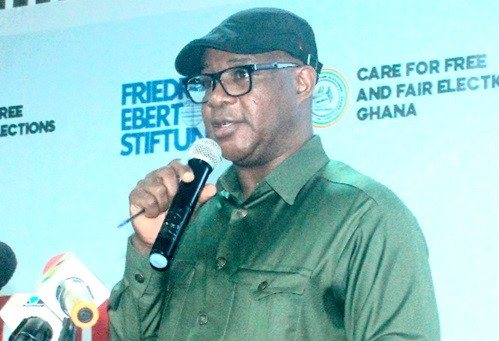
Military has no business at polling stations — Dr Bonaa
A security expert, Adam Bonaa, has advised that the military should not be anywhere close to any polling station during the December 7 polls.
He said their presence could be tantamount to "stealing the elections”.
Dr Bonaa said the police were well-resourced to handle activities before, during and after the polls, adding that the continual deployment of the military during such exercises should be discouraged.
Rather, he suggested that institutions should be strengthened and resourced to deal with any eventuality.
"We are not under attack. They could be deployed only during a state of emergency," he said.
Dr Bonaa was speaking at a democracy lecture series in Accra on the theme: "Ghana's democracy development: Assessing the implementation of the Vigilantism and related offences Act 2019 for ensuring peaceful December 2024 elections".
It was organised by Care for Free and Fair Elections Ghana (Care Ghana), a Civil Society Organisation (CSO) and Friedrich Ebert Stiftung (FES).
The democracy lecture series seeks to address the increasing instances of electoral violence, and inflammatory statements by high-ranking officials, and promote transparency on the steps to ensure peaceful, free, and fair elections on December 7, 2024.
Vigilantism
Dr Bonaa said since the promulgation of the Vigilantism and Related Offences Act, 2019 to disband vigilante groups; including political party vigilante groups and land guards; the groups had quadrupled to 72.
![]()
Some participants in the lecture
He said although about 20 of such groups were disbanded, they have metamorphosed into "men in uniforms" spread across all the security services.
"Unfortunately, those who get involved in such acts, are promoted. The danger is that those who perpetrated such acts are still in the system and in uniform.
"Some have modified their operations by forming private security companies to perpetrate the same atrocities in a disguised form," he alleged.
He called for the strengthening of law enforcement agencies while urging the judiciary to be fair in its rulings because a lack of trust could lead to civil disobedience.
Elections
The Head of the Political Science Department, University of Ghana, Legon, Prof. Alidu Seidu, said vigilantism had the propensities of disenfranchising people because once voters feared for their lives, they would not turn out to vote.
He said a number of these groups were emboldened by their "masters" who provided protection each time they got into trouble.
The political scientist said the root cause of vigilantism was mistrust among the political elites forcing each one to provide their personal security.
He urged the Electoral Commission (EC) to act professionally to instil trust, "for when people perceived it to be biased, they will resort to violence."
"The judiciary should also be neutral and impartial to instil confidence," he said.
Clarity
Providing some clarity to the topic, a former Chairman of the National Democratic Congress (NDC), Dr Samuel Ofosu Ampofo, whose doctoral thesis dwelt on the subject, said internal party security should not be misconstrued to be vigilantism.
"Internal party security are well trained by professionals to provide security and are on the payroll of the party.
"These are not violent groups unlike what we are witnessing in recent times," he said.
Dr Ampofo said in times past, names of returning offices and their deputies were published for people to do background checks, "unfortunately the situation has changed and all kinds of people are recruited to handle such an important job".
He expressed worry at the EC for giving all political parties equal voting rights at the Inter-Party Advisory Committee (IPAC) meetings.
Dr Ampofo said that was unfair knowing that the NDC and the New Patriotic Party (NPP) were bigger than the other smaller parties who acted as proxies for some parties.
Trajectory
Another political scientist from the University of Ghana, Dr Daniel Appiah, traced the history of vigilantism to the colonial era and under the first Republic where people could only access basic amenities with party cards.
He said the unfairness and unequal treatment gave birth to vigilantism.
